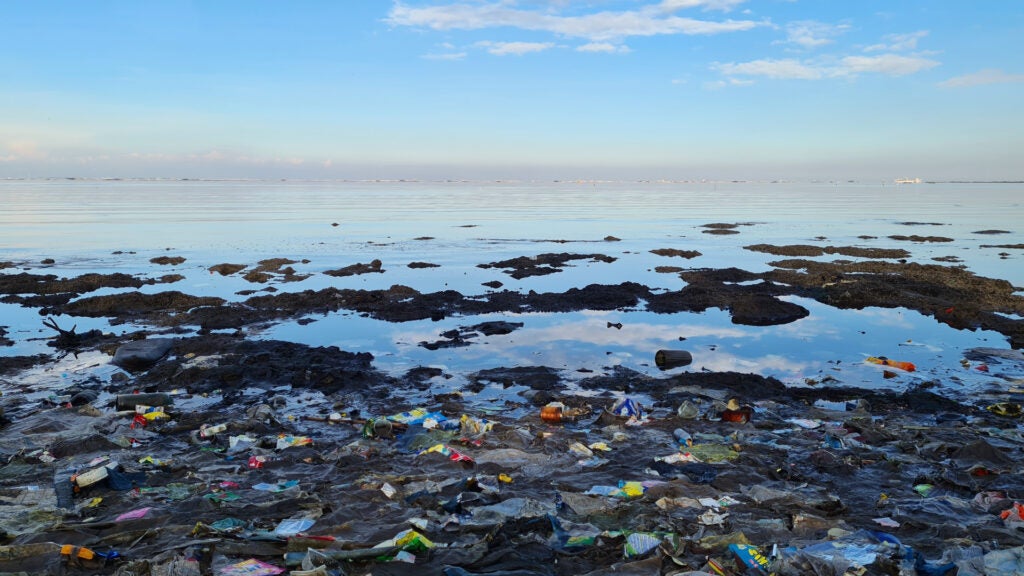Oceana, experts, civil society call for unified push to protect ocean from single use plastic pollution ahead of INC-5
Press Release Date: November 27, 2024

“The perils of single-use plastic cannot be overemphasized. We are not wanting in knowledge and information that continuing dependency on throw-away plastics is deleterious to the health and survival of not just fisheries, wildlife resources, habitats but also of humans. The time to stop plastic pollution is NOW. Banning single-use plastics needs a whole-of-society approach and this discussion is testament to our strong coalition to demand this with urgency.”
This was the statement of Oceana Vice President Atty. Gloria Estenzo Ramos as the Philippines participates in the Fifth Session of the Intergovernmental Negotiating Committee (INC-5) with a mandate to establish an international legally binding instrument on plastic pollution.
Responding to the escalating plastic crisis, Oceana recently hosted an online discussion with experts, policymakers, advocates, and encouraging citizens to advance critical policy recommendations. Oceana’s forum, entitled “Roundtable Discussion: The Single-Use Plastic Crisis” underscores the urgent need for comprehensive action to address the global threat of single-use plastics.
The environmental and health impacts of plastic pollution are well-documented and severe. Recent studies reveal that this issue has shifted from being solely an environmental concern to a significant public health crisis.
Dr. Deo Onda, Dean for Research, Innovation, Development, and Enterprise of the University of the Philippines’ Marine Science Institute discussed the ways that Filipinos are both directly and indirectly affected by plastic pollution: “Plastics can aggravate other issues including flooding and mitigation costs. Studies have shown that around 220 million people are actually at risk from plastic-aggravated flooding. With floods, you have spread of diseases which affects mental and psychosocial well-being. It damages properties and may cause loss of income and lives. Without immediate and decisive action, the adverse effects of plastics may become irreversible.”
The forum was held amid notable developments in the Philippines’ approach to plastic regulation. On July 9, 2024, the Court of Appeals ordered the National Solid Waste Management Commission (NSWMC) to issue a list of non-environmentally acceptable products (NEAP) within six months from the receipt of the order. However, the Court leaves the determination of the items on the list to the NSWMC.
Oceana and other stakeholders reiterate their call to the Commission to include single-use plastics in the NEAP list, advocating for a comprehensive ban to curb plastic waste at the source, from manufacturing and production to distribution and post-use.
Local efforts show the impact of strong policies and enforcement, with ordinances, plastic-free government offices, and Zero Waste city initiatives aimed at reduction of single-use plastics.
Quezon City’s chief for their Climate Change and Environmental Education Division, Ms. Lea Siy-Gaon, shares how QC Mayor Joy Belmonte acknowledges this and incorporates these insights into the city’s journey towards a plastic-free zone: “She [Mayor Joy] is looking at measures that prioritize the avoidance of all unnecessary plastic, a just transition with financial mechanism. City collaboration in the negotiation process should lead to interventions that are realistic. Talagang grounded siya doon sa nangyayari sa city. I think the most key player in that collaboration is the business community, especially the fast moving consumer goods (FMCG). These are the companies that are in a unique position talaga to drive the systematic and meaningful changes. So kung sa kanila nanggagaling na, they will change their packaging and resort to sustainable packaging, it will be more feasible for consumers to also adapt to that lifestyle.”
These examples underscore the potential of scalable, national solutions with the right policy framework and enforcement.
Greenpeace campaigner Marian Ledesma added: “Much of the problems we face now in relation to plastic pollution probably could have been avoided years ago with the release of a list of non-environmentally acceptable products (NEAP) and packaging and that includes single-use plastics. Bans also level the playing field for alternative models because for as long as meron tayong mga single-use plastics na mas mura, mas prevalent new business models and systems will face challenges in getting adopted.”
This online roundtable was organized by Oceana in partnership with EcoWaste Coalition, Greenpeace and Mother Earth Foundation.
Oceana is the largest international advocacy organization dedicated solely to ocean conservation. Oceana is rebuilding abundant and biodiverse oceans by winning science-based policies in countries that control one-quarter of the world’s wild fish catch. With more than 300 victories that stop overfishing, habitat destruction, oil and plastic pollution, and the killing of threatened species like turtles, whales, and sharks, Oceana’s campaigns are delivering results. A restored ocean means that 1 billion people can enjoy a healthy seafood meal every day, forever. Together, we can save the oceans and help feed the world. Visit Oceana.org to learn more.
For More Information:
Joyce Sierra, Communications Manager, Oceana
Mobile: 09178214430 E-mail: jsierra@oceana.org
Facebook: www.facebook.com/oceana.philippines
Twitter: @oceana_ph Instagram: @oceana_ph
